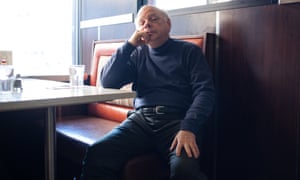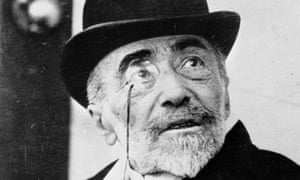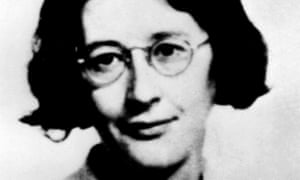Top 10 books to make you a better person
Don’t be put off! Works by WG Sebald, Roberto Bolaño and Wallace Shawn and others can help us to see ourselves more clearly and understand life better
Astonishing ... Wallace Shawn. Photograph: Tim Kox/Tim Knox
Greg Jackson
Wednesday 1 June 2016 12.15 BST
“If I knew for a certainty that a man was coming to my house with the conscious design of doing me good, I should run for my life,” wrote Thoreau, and this is roughly how I feel about the man giving me a book that will make me a better person. I dislike him, and yet here I am risking becoming him. Worse still, I seem to be suggesting that my own book bears mention in this dubious, self-approving category. Writing an “improving” book sounds like a terrific way of repelling readers.
When I wrote my book, Prodigals, I intended, if anything, no more than to give voice to the tensions I felt pulling me apart from the inside. Which tensions? The desire for community when we measure our worth against one another. The desire for fame when we know it is toxic. The need for other people when they are all unbearable. The need to do work that addresses the spirit when we live in a world that no longer believes in the spirit. The desire for identity when we know it will never be more than a convenient fiction … Could I turn my confusion into a suspended ambivalence, a scattered sand stilled and blown into glass, in which someone else might see himself, herself?
Greg Jackson
Wednesday 1 June 2016 12.15 BST
“If I knew for a certainty that a man was coming to my house with the conscious design of doing me good, I should run for my life,” wrote Thoreau, and this is roughly how I feel about the man giving me a book that will make me a better person. I dislike him, and yet here I am risking becoming him. Worse still, I seem to be suggesting that my own book bears mention in this dubious, self-approving category. Writing an “improving” book sounds like a terrific way of repelling readers.
When I wrote my book, Prodigals, I intended, if anything, no more than to give voice to the tensions I felt pulling me apart from the inside. Which tensions? The desire for community when we measure our worth against one another. The desire for fame when we know it is toxic. The need for other people when they are all unbearable. The need to do work that addresses the spirit when we live in a world that no longer believes in the spirit. The desire for identity when we know it will never be more than a convenient fiction … Could I turn my confusion into a suspended ambivalence, a scattered sand stilled and blown into glass, in which someone else might see himself, herself?
I don’t know. I don’t like even addressing what my work is about because I am in the unfortunate position of being presumed to know. But I can speak to my experience of other books and say that some have wanted to punish me with how awful people can be, and some have wanted to charm me with visions of happiness, and some have seemed very simply to care about me more than I was willing to credit them for. The last are books that respected me enough to address me honestly, with no concern for the comforting mythologies of our self-regard. They are the books on this list. They are not always hopeful, but they suggest that we might see ourselves clearly, or see our inability to see ourselves clearly clearly, that we might share private truths in public or find words for the fugitive shades of experience we value most, and in doing these things, they offered hope all the same.

‘The grim shadow of self-knowledge’ ... Joseph Conrad, pictured in 1923. Photograph: Hulton Getty
1. Lord Jim by Joseph Conrad
1. Lord Jim by Joseph Conrad
The story here is based on the true story of the SS Jeddah, a British steamship bearing Muslim pilgrims to Mecca that was abandoned by its crew. Conrad’s novel follows chief mate Jim as he struggles with his professional and moral failure. Every bit as harrowing as its predecessor, Lord Jim hovers over the mystery of Jim’s fateful, impulsive leap, unfurling from this decisive act ever more pleated layers of motive and rationale, until at last laying flat nothing surer than the sense that “no man ever understands quite his own artful dodges to escape from the grim shadow of self-knowledge”.
2. Memoirs of An Anti-Semite by Gregor von Rezzori
The five stories that make up this “novel” neither overlap, quite, nor share a protagonist, quite, but together build into a uniquely rich evocation of central Europe in the twilight years of the Austro-Hungarian empire. At the centre of each story is an ambiguous stand-in for the author: the child of down-at-heel Austrian aristocracy. Section by section, we watch this refracted, compound character come of age in a wattle-and-daub empire built of diverse peoples and local myths, in which antisemitism serves as a kind of glue. Unsparing in its presentation of the convenient attitudes that sanction the vilest regimes, Memoirs turns self-implication into a subtle and ferocious ethic and teaches that none of us is free from casual, dangerous moral lapses.
3. Distant Star by Roberto Bolaño
A distillation of Bolaño’s genius, Distant Star tells the story of experimental poet Carlos Wieder’s rise to prominence during the Pinochet years and the inhuman art he develops under the dictatorship. Written as a detective story, the novella turns an unblinking eye on the fatuity of literary idealism and the barbarity of art’s totalising visions. The romance of artist and fascist presents no contradiction: the same desire for a radical freedom from the moderating compromises of old orders and vocabularies leads the artist, no less than the fascist, into monstrous longing for a world without limits. Distant Star shows how this warped ideal may re-imagine our most heinous acts as aesthetic projects, how literature must stand in opposition to power or else assume its corruption.
Advertisement
4. Collected Stories by Deborah Eisenberg
Since around the time I was becoming a brand new person, Eisenberg has been writing stories of such undeceived lucidity about the shades of inner convenience and terror that had I read them then I might have refused to be born. I would at least have refused to grow up, something not many of us manage. No, we misuse the only language we have to close the distance between us in order to maintain the very falsehoods that strand us in flimsy private myths. Moving from New York society, in which money, drugs, art and urban subsistence form a well-knit system, to economic imperialism, in which the same elements string together the fortunes of rich and poor, Eisenberg tells the stories of people tremblingly awake to the tenuousness of the arrangements that make their lives possible.
5. The Boat by Nam Le
A Vietnamese writer in grad school weighs what use to make of his father’s experience at My Lai. A young Colombian assassin dreams of a paradise shimmering in the Caribbean beaches to the north. An ageing painter in New York, haunted by lost love and self-loathing, attempts to reconnect with his estranged daughter. Told with immersive fluency, and a ravishing power and grace, these stories possess an imaginative range that reflects the ethos of literary endeavour at its best. For all the human frailty Le documents, he returns again and again to our small acts of perseverance amid violence, reminding us how hard we must fight to preserve reasonable hope and lending credence to the notion that literature might help us.

Truth in wartime ... the last photograph of Simone Weil. Photograph: UIG via Getty Images
6. Essays by Wallace Shawn
6. Essays by Wallace Shawn
Shawn is best known as a great playwright, but also writes astonishing essays. Theatrically enough, performance informs the grounding belief of this book: that we could all have been many other people, and that the person we believe we are is a role we play. Each day, Shawn notes, hundreds of thousands of babies are born, each with the same capacity as you or I to enjoy life, learn, and make the world a better place – and our decisions will affect whether they can. These brilliant, mischievous essays break our moral questions apart and reassemble them in a language that begins to sound like sanity.
7. The Collected Stories by Grace Paley
“I don’t believe civilisation can do a lot more than educate a person’s senses,” Paley writes, and this is what her work does. In just a few dozen stories of breathtaking compression, written over 30 years, this collection brings to life the social and human complexity of New York in the middle decades of last century, seen from street level. Paley has compassion, even affection, for those who act badly, a warmth offset by a biting irony and wit. “If someone would hand me the first stone, I would not be ashamed to throw it,” a character remarks. “But at whom?”
8. Season of Migration to the North by Tayeb Salih
Loosely structured as a Heart of Darkness in reverse, where the journey recounted moves from small-town Sudan to elite London society and back again, this depthless, elusive classic of Arab literature breaks open as it presents and imposes itself. Salih explores not just the corrosive psychological colonisation observed byFrantz Fanon, but a more complex two-way orientalism, in which the charms of western thought, embodied in its poetry and liberal ideals, prove irresistible, even as the novel’s Sudanese narrators understand these as the tempting fruit of a poisoned tree.
9. War and the Iliad by Simone Weil and Rachel Bespaloff
Written just before and during the second world war, these two long essays unearth a set of moral teachings antecedent to the Gospels, estranged by history but profoundly relevant to our time. Homer’s Iliad is remarkable, the essayists agree, for presenting warring sides with equal compassion. As Weil writes, only the person “who has measured the dominion of force, and knows how not to respect it”, is capable of justice and love.
10. The Emigrants by WG Sebald
Against the backdrop of the Holocaust, The Emigrants opens an oblique window on mid-century horrors by looking at four individuals on the margins of the central tragedy. Only by focusing on the smallest terms of individual experience might we begin, by implication, to get a sense of the benumbing scale of the destruction visited on a continent and a race. A faint gleam of hope can be seen in the ruins: that, while buried, the past is not wholly irrecoverable. In fact it is everywhere impressed on the world, if we can only train our attention to see it.
No comments:
Post a Comment